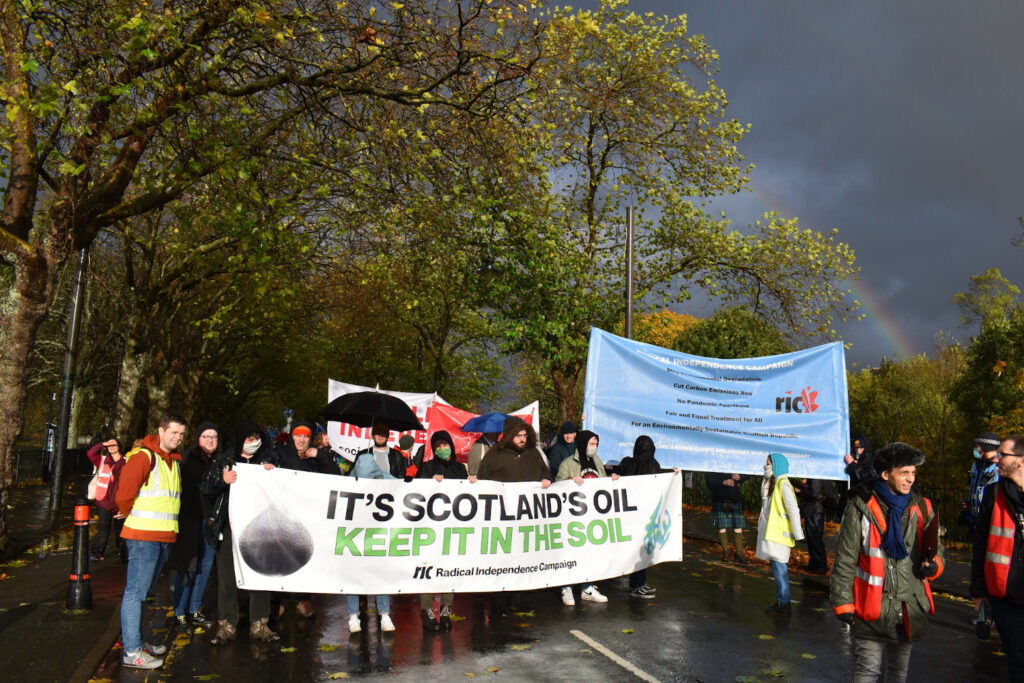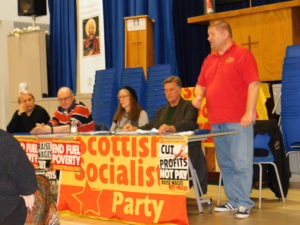The ecosocialist alliance issued a statement on 5 November 2022 for COP27, which was supported by anti*capitalist resistance and others.
COP27- Still Fiddling While the World Burns
COP 27, which will meet from the 6-18 November 2022, unfolds against a backdrop of growing climate chaos and ecological degradation. As this latest COP approaches, economic recession, increased poverty and war run alongside the multiple interlinked and inseparable crises of climate, environment, extinction and zoonotic diseases. We now face a global economic recession likely to be deeper even than that of 2008.
The economic spiral into recession will make addressing environmental crisis even more difficult, as states and corporations rush to increase fossil fuel production to offset the deepening energy crisis. They will try to make working people pay with their living standards and their lives, for the crisis of their rotten system. Resources which should be directed at adaptation and amelioration of the climate crisis will be diverted to war and fossil fuel production including dangerous Fracking and Underground Coal Gasification (UCG).
We face increasingly destructive wars, most notably in Ukraine which is destabilising world food supplies, and which has the potential for the use of nuclear weapons. War causes huge physical and social damage to people and societies and the military industrial processes produce 6% of all greenhouse gasses. The impact of wars in Ukraine, Yemen, Palestine and other places in terms of human and environmental cost, and on food production and energy costs, will continue to exacerbate the crises facing the environment and the global economy. Russia’s invasion of Ukraine must not be the pretext for a rush to fossil fuels, new coal and gas and the resumption of fracking. Quite the opposite- it should be a spur to shift more rapidly towards renewables.
As Ecosocialists, we say another world is possible. A massive social and political transformation is needed, requiring the mobilisation of the mass of working people, women and men, across the globe. Only the end of capitalism’s relentless pursuit of private profit, endless waste, and rapacious drive for growth, can provide the basis for a solution not only to climate change, environmental degradation, and mass extinction, but to global poverty, hunger, and hyper exploitation.
The COP 27 conference will take place in an isolated, heavily policed tourist resort, with only one major road in and out, and hotels charging rates that will likely push the entire COP beyond the means of many grassroots organisations, especially those from poorer countries in the Global South. The Egyptian government say there will be room for opposition, but what they mean, is that activists will be offered fake protests opportunities where state-affiliated NGOs demonstrate around the convention giving the impression of an independent local civil society. No real Egyptian or other opposition will be allowed near Sharm El-Sheikh. We send solidarity to Egypt’s climate campaigners, women’s organisations, Trade Unionists and workers fighting for democracy.
2022 has seen floods in Pakistan, directly affecting thirty-three million people, Australia and elsewhere. We have seen wildfires, extreme heat, ice melt, drought, and extreme weather events on many continents, yet governments pursue still more fossil fuel production. 2022’s summer of disasters broke records worldwide. In 2021, global sea level set a new record high and is projected to continue to rise. The United Nations reports that research shows that women and children are up to fourteen times more likely than men to die during climate disasters.
The big issues of climate change will be debated in Egypt but whatever is agreed, capitalism left to itself can at best mitigate, not end them. Environmental destruction is woven into the very fabric of the system itself. However, much big business resists, we will have to force it to act on a global scale. Ultimately, only the ending of capitalism itself and its replacement by democratic Ecosocialist planned production for need and not private profit can guarantee the necessary action.
Genuine climate solutions cannot be based on the very market system that created the problem. Only the organised working class, and the rural oppressed of the global south -women and men have the power to end capitalism, because their labour produces all wealth and they have no great fortune to lose if the system changes, no vested interests in inequality, exploitation, and private profit.
Sustainability and global justice
The long-term global crisis and the immediate effects of catastrophic events impact more severely on women, children, elders, LGBTQIA+, disabled people and the people of First Nations. An eco-socialist strategy puts social justice and liberation struggles of the oppressed at its core.
Migration is, and will increasingly be, driven by climate change and conflicts and resource wars resulting from it. Accommodating and supporting free movement of people must be a core policy and necessary part of planning for the future.
Action now to halt climate change!
We demand:
• All new fossil fuels must stay in the ground – no new gas, coal, or oil! No to Fracking and UCG!
• A rapid move to renewable energy for transport, infrastructure, industry, agriculture, and homes.
• A massive global programme of public works investing in green jobs, and replacing employment in unsustainable industries.
• The retrofitting of homes and public buildings with insulation and other energy saving measures to reduce fuel use and to address fuel poverty.
• A globally funded just transition for the global south to develop the necessary sustainable technologies and infrastructure.
• A major cut in greenhouse gas emissions of at least 70% by 2030, from a 1990 baseline. This must be comprehensive – including all military, aviation, and shipping emissions – and include mechanisms for transparent accounting, measurement, and popular oversight.
• The end of emissions trading schemes.
• No to ‘offsetting’ of carbon emissions- we need a real zero not net-zero.
We call for:
• Immediate cancellation of the international debt of the global south.
• A rapid shift from massive factory farms and large-scale monoculture agribusiness towards eco-friendly farming methods and investment in green agricultural technology to reduce synthetic fertiliser and pesticide use in agriculture and replace these with organic methods and support for small farmers.
• A massive reduction in meat and dairy production and consumption, with a view to its phasing out, through education and provision and promotion of high- quality, affordable plant-based alternatives.
• The promotion of agricultural systems based on the right to food and food sovereignty, human rights, and with local control over natural resources, seeds, land, water, forests, knowledge, and technology to end food and nutrition insecurity in the global south.
• The end of deforestation in the tropical and boreal forests by reduction of demand for imported food, timber, and biofuels.
• A massive increase in protected areas for biodiversity conservation.
• End fuel poverty through retrofitting energy existing homes and buildings with energy efficient sustainable technologies.
We demand a just transition:
• Re-skilling of workers in environmentally damaging industries with well-paid alternative jobs in the new economy.
• Full and democratic involvement of workers to harness the energy and creativity of the working people to design and implement new sustainable technologies and decommission old unsustainable ones.
• Resources for popular education and involvement in implementing and enhancing a just transition, with environmental education embedded at all levels within the curriculum.
• Urgent development of sustainable, affordable, and high-quality public transport with a comprehensive integrated plan which meets peoples’ needs and reduces the requirement for private car use.
• A planned eco-socialist economy which eliminates waste, duplication and environmentally harmful practices, reduction in the working week and a corresponding increase in leisure time.
• Work practices reorganised with the emphasis on fair flexibility and working closer to home, using a free and fast broadband infrastructure.
• An end to ecologically and socially destructive extractivism, especially in the territories of Indigenous peoples and First Nations .
• Respect for the economic, cultural, political and land rights of Indigenous peoples and First Nations.
As eco-socialists we put forward a vision of a just and sustainable world and fight with every ounce of our energy for every change, however small, which makes such a world possible. We will organise and assist wherever worker’s and community organisations internationally, raising demands on governments and challenging corporations.
If you would like to support the statement or contact Ecosocialist Alliance please email eco-socialist-action@protonmail.com
Ecosocialist Alliance, October 2022
Groups
Left Unity, UK
Anti-Capitalist Resistance, UK
Green Left, UK
Global Ecosocialist Network, International
RISE, Ireland
Parti de Gauche Marseille Nord, France
Socialist Project, Canada
Breakthrough Party, UK
People Before Profit, Ireland
Climate and Capitalism, International
XR Camden, UK
Anti-Fracking Nanas, UK
West Cumbria Friends of the Earth, UK
Save Euston Trees, UK
Ecosocialist Alliance UK Facebook Group, UK
Individuals
Beatrix Campbell, OBE, Writer, UK
George Monbiot, Environmental Writer & Activist, UK
Julia Steinberger, Professor of Ecological Economics, Lausanne University, Switzerland
Victor Wallis, author of Red Green Revolution, USA
Professor Krista Cowman ,Historian, UK
Marina Prentoulis, Associate Professor in Politics & Media, UEA; author of Left Populism in Europe, UK
Romayne Phoenix, Ecosocialist Campaigner, UK
Dr Jay Ginn, (retired academic researcher, UK
Alistair Sinclair Green Eco-Socialist Councillor, Lancaster City Council, UK
Clara Paillard, Unite the Union & Tipping Point UK, UK
Felicity Dowling, Left Unity Principal Speaker, UK
Derek Wall, Former GPEW Principal Speaker; Political Economy Lecturer, Goldsmiths; Author of Climate Strike,UK
Rob Marsden, Red Green Labour editorial board- personal capacity, UK
Jo Alberti, veteran left activist, UK
Doug Thorpe, Left Unity National Secretary, UK
Kevin Frea, Deputy Leader, Lancaster City Council, UK
Dee Searle, One Vote for the Planet activist, UK
Jim Hollinshead, Left Unity, UCU, UK
Ed Bober, UK
Patrick Fitzgerald, Artist, Vizcaya, Spain
Allan Todd, Climate & Anti-Fascist Activist; member of Left Unity’s NC, UK
Gordon Peters, Ecosocialist activist, UK
Tim Dawes, Former Chair Green Party of England and Wales; Rtrd. Senior Local Govt. Officer/Consultant, UK
Joe Human. climate activist, UK
Fiona Prior, Climate activist, grandmother, UK
Peter Murry, Ecosocialist activist, UK
Lucy Moy-Thomas, Climate Emergency Camden, UK
Tina Rothery, Climate Campaigner, UK
Dr. Richard Nicholson, Haywards Heath Town Councillor, UK
Sally Lansbury, Labour Party Cllr., Allerdale Borough Council, UK
Deanna Austin-Crowe, Health Worker, UK
Chris Bluemel, Musician & Activist, UK
Lucy Early, Ecosocialist Alliance member, UK
Joseph Healy, International Officer of Left Unity & UNITE Regional Officer, UK
Al Barnes, Paramedic & XR Activist, UK
Steve Masters, Climate activist and Green party councillor, UK
Alice Brown, One Vote for the Planet, UK
Jane Walby, Global Justice Now, Camden Fairtrade Network, Debt Justice, UK
Dorothea Hackman, Save Euston Trees, UK
Penelope Read, Eco-Warrior, Actor & Musician, UK
Samantha Barnes, Solicitor, UK
Charlotte Christensen, Mum & Anarchist, UK
Article originally published by Anti*Capitalist Resistance: https://anticapitalistresistance.org/cop27-still-fiddling-while-the-world-burns/


